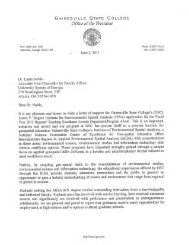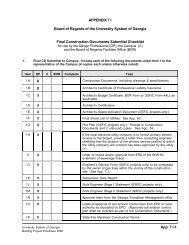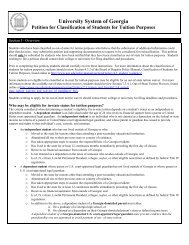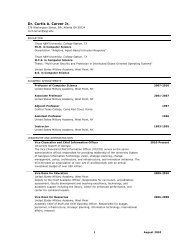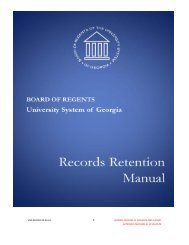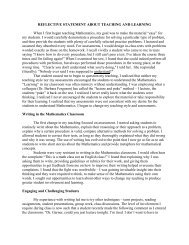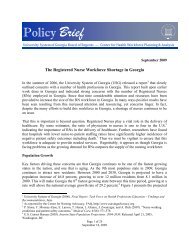WReier-Aviles on DSKGBLS3C1PROD with RULES266852 Federal Register / Vol. 75, No. 209 / Friday, October 29, 2010 / Rules and Regulationsrepresented through stated studentlearning outcomes and demonstratedachievement <strong>of</strong> those outcomes,regardless <strong>of</strong> the delivery method.One commenter recommendedrevising the proposed accreditingagency requirements in § 602.24(f) tostate that in the case <strong>of</strong> competencybasedprograms that do not use clockhours or classroom time as a basis forcredit, an accrediting agency mustdetermine the appropriate assignment <strong>of</strong>credit by reviewing a well-substantiatedlist <strong>of</strong> competencies and assessingdocumented evidence <strong>of</strong> studentachievement <strong>of</strong> competencies.A few commenters requested that the<strong>Department</strong> revise proposed§ 602.24(f)(2) to clarify that accreditingagencies have the authority andautonomy to determine reviewmethodologies and techniques.One commenter believed that itwould be appropriate for an accreditingagency to review a sample <strong>of</strong> aninstitution’s curriculum to determinewhether the credit assignment policieswere being appropriately applied by aninstitution, but it would not beappropriate for an accrediting agency toemploy an unspecified sample <strong>of</strong> otherinstitutions to determine whether or notthe credits awarded for a particularcourse or program conformed tocommonly accepted practice in highereducation. This commenter suggestedrevising proposed paragraph§ 602.24(f)(2) to specify that the agencymust sample courses within aninstitution’s program <strong>of</strong> study.One commenter suggested thataccrediting agencies review annualinstitutional submissions <strong>of</strong> data,policies, and procedures for assigningcredit hours.Discussion: We do not believe thatfurther specificity is appropriate ornecessary in § 602.24(f). Accreditingagencies must have the flexibility toreview institutional credit-assignmentprocesses that may vary widely in theirpolicies and implementation and mayhave differing methods for measuringstudent work such as direct assessment.We believe that accrediting agencies arecapable <strong>of</strong> developing appropriatemethods for evaluating institutionalcredit processes without providingfurther specificity in the regulations. Wenote that accrediting agencies mustdemonstrate their ability toappropriately review these areas inorder to receive recognition by theSecretary as reliable authorities on thequality <strong>of</strong> education or training <strong>of</strong>feredby the institutions and programs theyaccredit, and that evaluation by theSecretary continues during periodicreviews <strong>of</strong> accrediting agencies.We believe that it is not necessary tospecify how an accrediting agencyshould review a competency-basedprogram that does not use credit hoursor clock hours as a basis for credit. Inthe case <strong>of</strong> a competency-basedprogram, the institution may either basethe assignment <strong>of</strong> credit on the time ittakes most students to complete theprogram, or the program must meet thedefinition <strong>of</strong> a direct assessmentprogram in § 668.10. In the firstscenario, the institution’s accreditingagency would review the institution’scompliance with the provisions in§ 600.2 or § 668.8(k) and (l) asapplicable. In the second scenario, theinstitution’s accrediting agency mustreview and approve each <strong>of</strong> theinstitution’s direct assessmentprogram’s equivalencies in terms <strong>of</strong>credit hours or clock hours.Changes: None.Comment: A few commentersopposed the proposed provisions in§ 602.24(f)(1)(i)(A) and (B) requiringaccrediting agencies to evaluate aninstitution’s policies and procedures fordetermining credit hours in accordancewith proposed § 600.2 and to evaluatean institution’s application <strong>of</strong> thosepolicies and procedures to its programsand courses. Two commenters suggestedthat the provisions should not requireaccrediting agencies to evaluatecompliance with proposed § 600.2 butshould permit institutions to justify themanner in which credit hours areassigned and permit accreditingagencies to determine whether aninstitution’s application <strong>of</strong> its policiesand procedures are appropriate. Thesecommenters believed that the proposedprovisions require accrediting agenciesto instruct institutions to follow aspecific approach to assigning credithours.A few commenters suggested that thecross reference to the proposed credithourdefinition in § 600.2 be strickenfrom proposed § 602.24(f)(1)(i)(A) andreplaced with a provision requiringaccrediting agencies to conduct theirreview <strong>of</strong> an institution’s assignment <strong>of</strong>credit hours consistent with theprovisions <strong>of</strong> § 602.16(f).Discussion: We do not believe that theprovisions in proposed § 602.24(f)require accrediting agencies to mandatespecific policies for institutions withregard to assigning credit hours toprograms and coursework. However, wedo believe that it is necessary to specifyin § 602.24(f) that accrediting agenciesmust review an institution’s policiesand procedures for determining credithours, and the application <strong>of</strong> thosepolicies and procedures to programsand coursework in accordance withVerDate Mar2010 14:10 Oct 28, 2010 Jkt 223001 PO 00000 Frm 00022 Fmt 4701 Sfmt 4700 E:\FR\FM\29OCR2.SGM 29OCR2§ 600.2 for title IV, HEA programpurposes. Accreditation by anaccrediting agency recognized by theSecretary is an institutional andprogrammatic requirement for eligibilityfor the title IV, HEA programs.It is appropriate to specify theresponsibilities <strong>of</strong> an accrediting agencyin reviewing institutions’ processes forassigning credit hours in § 602.24, andnot § 602.16. The provisions in § 602.24are related specifically to proceduresaccrediting agencies must have forinstitutions they accredit to obtaineligibility to participate in title IV, HEAprograms. The provisions in § 602.16(f)address the processes used byaccrediting agencies in setting standardsin statutorily-defined areas required foragencies to be recognized by theSecretary.Changes: None.Comment: A few commentersexpressed concern about proposed§ 602.24(f)(1)(ii), which requiresaccrediting agencies to determinewhether an institution’s assignment <strong>of</strong>credit hours conforms to commonlyaccepted practice in higher education.A few commenters believed that thisproposal was inconsistent with theproposed credit-hour definition in§ 600.2 and expressed a preference forthe language in proposed§ 602.24(f)(1)(ii).One commenter suggested strikingthis proposed provision from theregulations and including thisinformation in the ‘‘Guide to theAccrediting Agency RecognitionProcess’’ issued by the <strong>Department</strong>. Thisguide was issued in August 2010 underthe title ‘‘Guidelines for Preparing/Reviewing Petitions and ComplianceReports.’’One commenter suggested revisingproposed § 602.24(f)(1)(ii) to requireaccrediting agencies to evaluateinstitutions’ assignment <strong>of</strong> credit hoursbased on a comparative study <strong>of</strong> similarinstitutions.Discussion: We do not agree that theprovisions in §§ 600.2 and602.24(f)(1)(ii) are inconsistent. Theprovisions in § 600.2 establish a title IV,HEA program requirement forinstitutions to award credit hours for anamount <strong>of</strong> academic work that is areasonable equivalency to the amount <strong>of</strong>work defined in paragraph (1) <strong>of</strong> thecredit-hour definition. By comparison,the reference to ‘‘commonly acceptedpractice in higher education’’ in§ 602.24(f)(1)(ii) establishes theparameters for accrediting agencies todetermine whether institutions establishreasonable equivalences for the amount<strong>of</strong> work in paragraph (1) <strong>of</strong> the credithourdefinition within the framework <strong>of</strong>
Federal Register / Vol. 75, No. 209 / Friday, October 29, 2010 / Rules and Regulations66853WReier-Aviles on DSKGBLS3C1PROD with RULES2acceptable institutional practices atcomparable institutions <strong>of</strong> highereducation.We believe that it is necessary toinclude § 602.24(f)(1)(ii) in theregulations, rather than solely in the<strong>Department</strong>’s ‘‘Guidelines for Preparing/Reviewing Petitions and ComplianceReports.’’ The regulations provide therequirements for accrediting agenciesrecognized by the Secretary whereas the‘‘Guidelines for Preparing/ReviewingPetitions and Compliance Reports’’provides guidance to accreditingagencies seeking the Secretary’srecognition and does not have the force<strong>of</strong> regulations. We will rely upon theaccrediting agencies to choose themethods used to evaluate institutions’processes for assigning credit hours.Changes: None.Comment: One commenter expressedconcern that the reference to ‘‘commonlyaccepted practice in higher education’’in proposed § 602.24(f)(1)(ii) mayrequire institutions that primarily useclock hours to adopt credit-hourassignment policies that were developedby traditional four-year degree grantinginstitutions, but are unsuitable forspecialized institutions.Discussion: The reference to‘‘commonly accepted practice in highereducation’’ in § 602.24(f)(1)(ii) is not arequirement for clock-hour institutionsto convert to credit hours.Changes: None.Notification RequirementsComment: Several commentersopposed proposed § 602.24(f)(4) thatwould require an accrediting agency,that identifies noncompliance with theagency’s policies regarding aninstitution’s credit assignments during areview under proposed § 602.24(f), tonotify the Secretary <strong>of</strong> the identifieddeficiencies. A few commentersbelieved that proposed § 602.24(f)(4)lacked due process provisions. Some <strong>of</strong>these commenters believed that thenotification requirement would forceaccrediting agencies to report minor ortrivial credit-hour problems to the<strong>Department</strong>. One commenter believedthat institutions would not be affordedan opportunity to respond to allegationsor attempt immediate corrective actionswhich may lead to delayed resolutionsto credit assignment problems.A few commenters believed thatproposed § 602.24(f)(4) was redundantwith regard to the existing notificationrequirements in § 602.27. Thesecommenters suggested removingproposed paragraph § 602.24(f)(4) andcross-referencing § 602.27.One commenter believed thatproposed § 602.24(f)(4) contradicts therequirements <strong>of</strong> proposed § 602.24(f)(3)which requires an accrediting agency totake appropriate action to address anyinstitutional deficiencies it identifies aspart <strong>of</strong> its review under proposed§ 602.24(f)(1)(i).A few commenters believed that theterms ‘‘systemic noncompliance’’ and‘‘significant noncompliance’’ inproposed § 602.24(f)(4) needclarification. One commenter suggestedspecifying that if an accrediting agencyhas any reason to believe that aninstitution is failing to meet its title IV,HEA program responsibilities, or isengaged in fraud or abuse, then thatagency must notify the <strong>Department</strong> inaccordance with existing regulations.Another commenter suggestedspecifying that if an accrediting agencydetermines that an institution does notdevelop and adhere to an acceptablecredit assignment policy, then theagency must promptly notify theSecretary. This commenter alsosuggested that because institutions willbe developing new credit policies, theyshould be afforded an adjustment periodto receive and react to guidance fromaccrediting agencies on their creditassignment policies prior to beingreported to the Secretary.Discussion: We agree with thecommenters that § 602.24(f)(4) does notspecify due process provisions forinstitutions. Section 602.24(f)(4) onlyrequires an accrediting agency to reportits findings and an agency’s process <strong>of</strong>establishing and reporting a finding willrely upon the agency’s own procedures.The Secretary recognition processensures that accrediting agencyprocedures provide due process.Further, we believe § 602.24(f)(4) isneeded because it corresponds to theprovisions in § 602.27 that require anaccrediting agency to submitinformation upon request from theSecretary about an accredited orpreaccredited institution’s compliancewith its title IV, HEA programresponsibilities. The provisions in§ 602.24(f)(4) specify the agency’sexisting responsibility under § 602.27with regard to inappropriateinstitutional processes for assigningcredits.We do not agree with the commenterwho believed that § 602.24(f)(3) and(f)(4) is contradictory. The provisions in§ 602.24(f)(3) require an accreditingagency to take appropriate action toaddress any institutional deficiencies itidentifies as part <strong>of</strong> its review under§ 602.24(f)(1)(i). Section 602.24(f)(4),however, requires an accrediting agencyto notify the Secretary <strong>of</strong> any severedeficiencies such as systemic orsignificant noncompliance with theVerDate Mar2010 14:10 Oct 28, 2010 Jkt 223001 PO 00000 Frm 00023 Fmt 4701 Sfmt 4700 E:\FR\FM\29OCR2.SGM 29OCR2agency’s policies identified at aninstitution during a review under§ 602.24(f).The terms ‘‘systemic noncompliance’’and ‘‘significant noncompliance’’ do notencompass trivial or minor deficiencies.The term ‘‘systemic noncompliance’’refers to an institutional process forawarding credits that is fundamentallyflawed with regard to assigning credithours in accordance with the credithourdefinition in § 600.2 and itsaccrediting agencies policies. The term‘‘significant noncompliance’’ refers toinstitutional assignment <strong>of</strong> credit hoursto individual courses or programs thatare particularly egregious with regard tothe compliance with § 600.2.We do not believe that it is necessaryto delay the effective date <strong>of</strong> thedefinition <strong>of</strong> a credit hour in § 600.2 or§ 602.24(f) in these final regulations. Aninstitution must implement thedefinition <strong>of</strong> a credit hour regardless <strong>of</strong>whether its accrediting agency hasissued guidance on the implementation<strong>of</strong> § 602.24(f). While an accreditingagency is required to implement§ 602.24(f) effective July 1, 2011, we willreview on a case-by-case basis, based onan adequate justification as determinedby the Secretary, any reasonable requestfrom an accrediting agency for a delayedimplementation date.Changes: None.State Agency Procedures (§ 603.24(c))GeneralComment: Several commentersopposed proposed § 603.24(c). A fewcommenters believed that the proposedprovisions would be confusing for Stateagencies and that State agencies do nothave the administrative capabilities toreview institutions’ credit-hour policies.One commenter believed that theproposed provisions would lead toinconsistencies and inequalitiesbetween States based on States’ reviews<strong>of</strong> institutions’ credit policies andenforcement <strong>of</strong> institutions’ compliancewith the proposed credit-hour definitionat § 600.2.One commenter believed that someState agencies, such as those in Iowa,would not be able to comply withproposed § 603.24(c) because theagencies may operate within the definedscope authorized by the State code andcompliance would require changes inState law. This commenter also believedthat some State agencies would not havethe expertise to evaluate institutions’credit policies.One commenter suggested specifyingthat if a State agency determines that aninstitution does not develop and adhereto an acceptable credit assignment
- Page 1 and 2: Friday,October 29, 2010Part IIDepar
- Page 3 and 4: Federal Register / Vol. 75, No. 209
- Page 6 and 7: 66836 Federal Register / Vol. 75, N
- Page 8 and 9: 66838 Federal Register / Vol. 75, N
- Page 10 and 11: WReier-Aviles on DSKGBLS3C1PROD wit
- Page 12 and 13: 66842 Federal Register / Vol. 75, N
- Page 14 and 15: 66844 Federal Register / Vol. 75, N
- Page 16 and 17: WReier-Aviles on DSKGBLS3C1PROD wit
- Page 18 and 19: 66848 Federal Register / Vol. 75, N
- Page 20 and 21: 66850 Federal Register / Vol. 75, N
- Page 24 and 25: 66854 Federal Register / Vol. 75, N
- Page 26 and 27: WReier-Aviles on DSKGBLS3C1PROD wit
- Page 28 and 29: 66858 Federal Register / Vol. 75, N
- Page 30 and 31: 66860 Federal Register / Vol. 75, N
- Page 32 and 33: 66862 Federal Register / Vol. 75, N
- Page 34 and 35: 66864 Federal Register / Vol. 75, N
- Page 36 and 37: 66866 Federal Register / Vol. 75, N
- Page 38 and 39: WReier-Aviles on DSKGBLS3C1PROD wit
- Page 40 and 41: WReier-Aviles on DSKGBLS3C1PROD wit
- Page 42 and 43: 66872 Federal Register / Vol. 75, N
- Page 44 and 45: WReier-Aviles on DSKGBLS3C1PROD wit
- Page 46 and 47: WReier-Aviles on DSKGBLS3C1PROD wit
- Page 48 and 49: WReier-Aviles on DSKGBLS3C1PROD wit
- Page 50 and 51: 66880 Federal Register / Vol. 75, N
- Page 52 and 53: WReier-Aviles on DSKGBLS3C1PROD wit
- Page 54 and 55: 66884 Federal Register / Vol. 75, N
- Page 56 and 57: 66886 Federal Register / Vol. 75, N
- Page 58 and 59: WReier-Aviles on DSKGBLS3C1PROD wit
- Page 60 and 61: WReier-Aviles on DSKGBLS3C1PROD wit
- Page 62 and 63: WReier-Aviles on DSKGBLS3C1PROD wit
- Page 64 and 65: WReier-Aviles on DSKGBLS3C1PROD wit
- Page 66 and 67: WReier-Aviles on DSKGBLS3C1PROD wit
- Page 68 and 69: WReier-Aviles on DSKGBLS3C1PROD wit
- Page 70 and 71: WReier-Aviles on DSKGBLS3C1PROD wit
- Page 72 and 73:
66902 Federal Register / Vol. 75, N
- Page 74 and 75:
WReier-Aviles on DSKGBLS3C1PROD wit
- Page 76 and 77:
WReier-Aviles on DSKGBLS3C1PROD wit
- Page 78 and 79:
66908 Federal Register / Vol. 75, N
- Page 80 and 81:
WReier-Aviles on DSKGBLS3C1PROD wit
- Page 82 and 83:
66912 Federal Register / Vol. 75, N
- Page 84 and 85:
WReier-Aviles on DSKGBLS3C1PROD wit
- Page 86 and 87:
66916 Federal Register / Vol. 75, N
- Page 88 and 89:
WReier-Aviles on DSKGBLS3C1PROD wit
- Page 90 and 91:
WReier-Aviles on DSKGBLS3C1PROD wit
- Page 92 and 93:
WReier-Aviles on DSKGBLS3C1PROD wit
- Page 94 and 95:
66924 Federal Register / Vol. 75, N
- Page 96 and 97:
WReier-Aviles on DSKGBLS3C1PROD wit
- Page 98 and 99:
66928 Federal Register / Vol. 75, N
- Page 100 and 101:
WReier-Aviles on DSKGBLS3C1PROD wit
- Page 102 and 103:
66932 Federal Register / Vol. 75, N
- Page 104 and 105:
WReier-Aviles on DSKGBLS3C1PROD wit
- Page 106 and 107:
66936 Federal Register / Vol. 75, N
- Page 108 and 109:
66938 Federal Register / Vol. 75, N
- Page 110 and 111:
66940 Federal Register / Vol. 75, N
- Page 112 and 113:
66942 Federal Register / Vol. 75, N
- Page 114 and 115:
66944 Federal Register / Vol. 75, N
- Page 116 and 117:
66946 Federal Register / Vol. 75, N
- Page 118 and 119:
WReier-Aviles on DSKGBLS3C1PROD wit
- Page 120 and 121:
WReier-Aviles on DSKGBLS3C1PROD wit
- Page 122 and 123:
WReier-Aviles on DSKGBLS3C1PROD wit
- Page 124 and 125:
66954 Federal Register / Vol. 75, N
- Page 126 and 127:
WReier-Aviles on DSKGBLS3C1PROD wit
- Page 128 and 129:
66958 Federal Register / Vol. 75, N
- Page 130 and 131:
66960 Federal Register / Vol. 75, N
- Page 132 and 133:
WReier-Aviles on DSKGBLS3C1PROD wit
- Page 134 and 135:
WReier-Aviles on DSKGBLS3C1PROD wit
- Page 136 and 137:
WReier-Aviles on DSKGBLS3C1PROD wit
- Page 138 and 139:
66968 Federal Register / Vol. 75, N
- Page 140 and 141:
66970 Federal Register / Vol. 75, N
- Page 142 and 143:
66972 Federal Register / Vol. 75, N
- Page 144 and 145:
66974 Federal Register / Vol. 75, N



